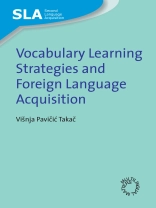This is the first book that deals primarily with vocabulary learning strategies as a specific and integral subgroup of language learning strategies. Its aim is to define the concept of language learning strategies in general and their features on the basis of cognitive theory and relevant models of second language acquisition as the basis for empirical research. Furthermore, the book gives a survey of relevant research on vocabulary learning strategies and describes three original empirical studies. Thus, the book integrates the approaches of theories of second language acquisition, the theory and practice of instructed foreign (second) language learning, and the findings of current empirical research.
Tabela de Conteúdo
Introduction
Chapter One: Factors Affecting Vocabulary Learning and Acquisition
Chapter Two: Theoretical Anchorage
Chapter Three: Survey of Research on Vocabulary Learning Strategies
Chapter Four: Studies on Vocabulary Learning Strategies
Chapter Five: Summary, Some Implications for Practice and Research, and Conclusions
References
Appendices
Sobre o autor
Višnja Pavičić Takač is Professor at the Faculty of Humanities and Social Sciences, University of Osijek, Croatia. Her professional and research interests include individual differences in FL learning, language learning strategies, communicative competence, lexical development, cross-linguistic studies, metadiscourse in FL writing, and pre-service teacher education. For many years, she was a reviewer of state school-leaving exam in Croatia. She has been a member of a number of international and national scientific projects and has presented more than 40 papers at national and international conferences. She has more than 50 published papers and book chapters and has authored and co-authored three books and four edited volumes.












